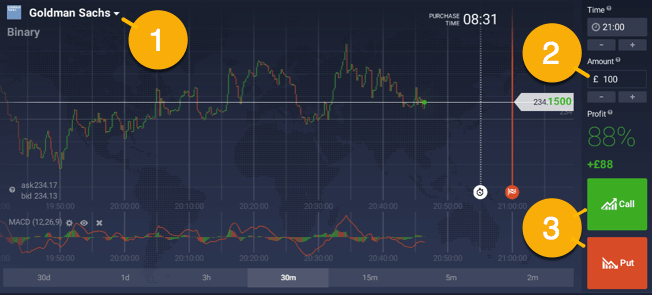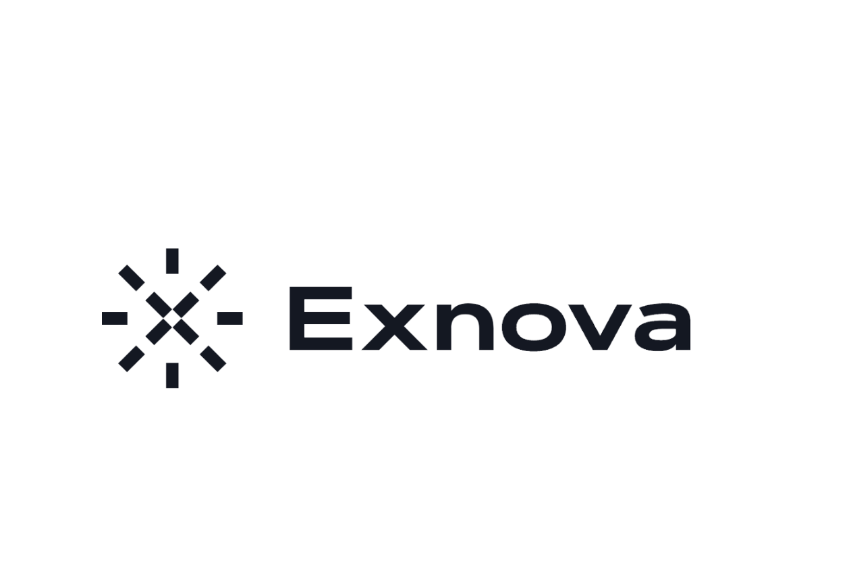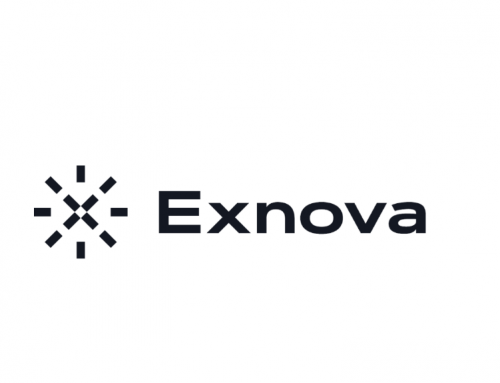Everything you need to successfully trade binary options.
research. Find your broker. Trade.
For UK investors, binary options trading is a tax-free form of investment with very fast results that take minutes rather than months or years. The word binary is used because there are two possible outcomes: either the trade is successful and the investor earns a significant return (usually between 75% and 95%), or the trade is unsuccessful and the entire invested amount is lost.
However, during 2018, European regulators banned the sale or promotion of binary and digital options to retail investors in the EEA. This includes the UK. Now, only professional clients or professional accounts can trade binaries with regulated companies. Professional traders must meet 2 out of 3 criteria:
- Open at least 10 ‘significant size’ trades per quarter (brokers define ‘significant’ differently)
- Own a portfolio or trading capital of at least €55,000
- 2 years of experience in the financial industry or experience with complex trading tools.
Unregulated companies may not comply with the new ESMA rules and will continue to accept UK traders. This increases the risk for traders and makes finding a reliable broker all the more important. However, with brokers regulated outside the EU, you can still find brokers regulated by respected institutions that can accommodate EU traders.
‘Binaries’ (or ‘digital options’) are therefore a high-risk form of investment, but offset by very high potential payoffs with minimal waiting time. Most brokers are regulated, giving consumers the protection they expect while using this type of financial product. Proceeds from binary trading are currently considered tax-free by HMRC.
Best Brokers 2019
What are binary options?
Binary Options Meaning – Binary options are derivatives and are traded on any asset or market. For example stock prices (Twitter, AstraZeneca, etc.), indices (FTSE, DAX, Nikkei), commodity values (gold, crude oil) or exchange rates (EUR/USD, GBP/USD). You can also trade cryptocurrencies such as Bitcoin or Ethereum.
The key difference between traditional stockbroker trading and binary trading is clearly identifying the risks and rewards before the trade. Investors know exactly how much is at risk and determine the exact value of potential returns. You don’t need a calculator, formula or math degree to calculate your profit or loss in binary options.
This deal structure has led to the widely used terms “all or nothing” or “cash or nothing”.
The only decision for traders is whether the underlying asset will rise or fall in value. The degree of price movement does not matter. Traders are purely guessing whether the price will be higher or lower than the current price at a specific time in the future.
Short-term price movements can be triggered by news stories or headlines, quarterly statistics, buying rumors or global security concerns.
Binary options trading offers yes/no propositions. There are differences between high/low options, but this type of investment always has a black and white binary outcome. When a trade can be sold at close, redemption, or mid-trade, the payout will absolutely have a number between 0 and 100, and the price will move as the market dictates until the trade closes.
Expire Time
All binary options come with expiry times. This is where the deal ends. So, the price at expiration is the price that determines whether an option won or lost (“in the money” or “in the money” in binary jargon). This expiry time can stretch from just 30 seconds or 1 minute (referred to as ‘turbo’) to a full day (‘expire date’), and even up to a year in some circumstances.
However, binary options are generally used for short-term trading, usually less than 30 minutes (5 minutes being the most used). Long maturities and fixed risk factors make it a useful tool for hedging or diversifying other assets.
Charges change depending on the asset and maturity time. The differences can be significant, so traders looking to use long-term binary options should do some shopping to find the best payout for the asset class they want to trade.
Legal Investment
Binary trading is in a period of growth but remains a relatively unknown product. Over time this is likely to change. Digital options (as they are also known) offer very simple financial adjustments. They are a legitimate way to play the financial markets.
Binaries offer clear trading choices, but are either high risk or high reward. However, since there is no leverage exposure in binary trading, risk and reward ratios are also easy to manage.
Are binary options safe?
Binary options have a bad reputation. This is basically the result of inaccurate and irresponsible marketing and cybercrime, and not a problem with the product itself. With more stringent regulation and greater understanding by a broader public, these options could move into the financial mainstream. This is where they first developed it.
FCA regulators and businesses may still have flaws and flaws, but they are not scammers. Angry emails focus entirely on “unregulated brokers” or “get-rich-quick” routes that promise “easy money.” Read the section on avoiding fraudulent brokers below.
Advantages of binary trading
Many of the advantages of using binaries are interrelated or linked. Here are some of the benefits of using this type of investment to retail investors as well as market makers or brokers.
Crisis Management
Risk management is obvious when trading binary options. The trade amount is the full amount at risk. This clearly presents a risk to traders as well as brokers. Their pricing model reflects an accurate knowledge of their responsibilities.
Trading Fees and Spreads
The certainty of risk provides a solid foundation for brokers to work and manage. This leads to lower trade feeds, tighter spreads and higher payouts. To further protect yourself, you can use a liquidity provider or hedge your position. Expensive broker fees from clearinghouses become unnecessary.
Benefits
Leverage or gearing is usually not available in binary trading. This again benefits the broker as it means that all trades must be fully funded. In other words, traders cannot default their trades. With leverage, you run the risk of the broker not paying out if things go wrong. This is a big difference from spot forex or spread betting.
Trader’s Choice
It can add a layer of complexity to standard fixed payment options. From ladder options to advanced ‘nesting’ options to create border trades or ‘strangles’ and more, binaries can be used in many ways.
Binary trading offers the highest level of flexibility. They even provide a mechanism to keep the market flat, arbitrage, or view the trading volume of the underlying asset.
Robots and Auto Trading
Automated trading robots (‘bots’) often rely on signals and algorithms triggered by price graphs. Again, these robots attract many undesirable operators and the automatic nature of trading further increases the risk. New traders should be especially careful. Finding the right robot service requires a large amount of ‘due diligence’.
An alternative is for traders to build their own robots using their own entry points. More and more brokers are offering traders the ability to combine their own trading robots or programs with simple tools. These hacks allow any combination of technical analysis setups such as moving averages, Bollinger bands or RSI/MFI patterns, and if these criteria are met open trades are possible. We’ve made our Binary Options ‘Pro’ robot available to everyone.
Best Robot
scam
Binary trading itself is legal and not a scam. However, there are brokers and signal providers that are unreliable and practice scams or scams.
It is important not to build the concept of binary trading purely on the basis of dishonest brokers. These scammers continue to drag down the image of this form of trading. As regulators and rulemakers begin to undertake this work, they are cleaning up the industry. If you would like to complain about the moderators to the watchers, please let us know via the contact page.
Avoid scams with this simple check
- “Make Money Online” or “Get Wealthy Fast” Marketing . This is a huge red flag. Binary options are a high-risk, high-reward investment vehicle. They are not rich quick schemes and should not be sold as such. There is no “no loss” system. Operators who make such claims are dishonest. Binary options millionaires are almost certain. The Brit Method is one important example.
- Cold call . Reputable brokers rarely make call calls. Cold calling is an unreliable middleman. Email contacts may be included.
- Bonus Terms and Conditions . If you receive a bonus, please read the terms and conditions. Some conditions include tying in an initial deposit or capital until turnover requirements are met. Deposits are still the trader’s money. Honest brokers do not charge before the transaction is complete. Better brokers also give the trader the option of canceling the bonus if it doesn’t suit them. Leading regulator CySec recently banned the use of deposit match bonuses that customers expect to lead to ‘trade deals’.
- Account manager . Be very wary of account managers, tipsters or ‘experts’ who want to transact on behalf of their clients. There is an obvious conflict of interest. I have a job with a broker. These managed accounts generally encourage traders to trade figures beyond their means. This “sale” is very harmful. The very dangerous Martingale system is a frequent tactic, and quickly blows a lot off balance.
- Recommended celebrities . A sports legend or team sponsorship is usually good and verifiable. Where this sponsorship should worry new investors is where mega-rich billionaires or names from trusted sources are ‘pushed’ as a selling point. Warren Buffett, Richard Branson, and Martin Lewis have been presented as supporting certain proposals with no real involvement whatsoever other than filing damages claims against perpetrators through lawsuits.
- Traders need to know their brokers. It seems certain – but some operators of brokers ‘funnel’ customers their of their choice, not yes. If a seller requires a new broker to sign up with a specific broker, or chooses a broker from a limited list, do not proceed. Traders need to know which broker they will be trading with!
Knowing the above methods, newcomers to binary trading can avoid less responsible brands. Improved regulation and awareness will reduce these types of complaints. Then the binaries can move forward.
The services of already fallen victims? can help.
The recent ban on binaries in the EU has not been considered and could lead to scamming more traders.
Trading strategy
The strategy page contains over 20 known systems and expert tips and advice from various forums and club chats. From high-risk Martingale to complex systems like Rainbow. It also covers more specialized topics such as forex, technical analysis, best price action indicators, trading signals and winning strategies. All of this to help you gain an edge and win.
signals
Signals are warnings to traders. Designed as a trading tool, it helps traders find opportunities. You can communicate in many ways: email, SMS, or live signal websites or groups. Much of the irresponsible marketing associated with binary scams is tied to signals or automated trading robots that utilize them. There are also very good providers. But in general, learning how to trade binaries is a safer route than using signals to compensate for your lack of trading knowledge.
Does the signal work?
Occasionally, but rarely in isolation. Some providers offer a combination of education with signals, which is a good combination. Traders should be able to fully evaluate a signal before judging its quality. We also feature the best providers on our Signals page.
Brokers and reviews
Binary options are available in a variety of methods and on a variety of instruments and markets. This means that finding the best dealer, best account or best trading platform really depends on the individual investor’s needs.
For example, some brokers may focus on trading foreign exchange (forex) and Japanese yen, euros or sterling. Others are strong on commodities and can only offer a handful of FX markets. Likewise, returns (or payouts) can vary between asset classes and vary by up to 25%, making it easy to see the importance of making the right choice.
Payment method
White-label platform providers such as SpotOption, Tradologic or TechFinancials also determine what the host site can offer, so a custom-designed exclusive broker may be preferred. Payment methods take some thought – if traders want to use Skrill, Paypal, Neteller or wire transfer, they should check if the broker offers this.
Trading App
The quality of mobile trading apps provided by brokers or binary agents can also vary. Some are programmed specifically for features on specific models, such as the iPad or iPhone. Others ensure cross-platform compatibility, providing Android, Blackberry and Windows tablets and devices. Some traders may have custom needs for a handheld app, others may not.
Trade size limits may direct some investors to point or leave a particular trading account. Some brokers offer trades as low as £1, while others accept investors willing to put £200,000 on a single trade. Therefore, every investor should consider their own trading style before deciding to open an account. Even making the ‘cheapest’ broker is not an easy task.
How to Compare the Best Trading Platforms
Our comparison table provides a brief summary of the key points when comparing brokers. A detailed review then allows potential new users to evaluate the finer points that can confirm their decision. Here is a list of essential comparison points for brokers.
- Payout
- Via counter or exchange trading options
- Minimum Deposit (Plus Deposit and Withdrawal Methods)
- Minimum Trade / Max Trade
- Trading platform
- News event feed
- List of assets (expanded list may include ETFs, bonds and trusts)
- Charts / chart tools (graph types, forecast tools)
- Available expiration time
- Regulations (FCA, CySec, CFTC, etc.)
- Range of available options (boundary, ladder, high yield, etc.)
- Welcome bonus
- Complaints / Customer Feedback
- Account types and benefits (VIP, Basic, Platinum)
- Plugins and Integrations. (e.g. MT4/MetaTrader4/MetaTrader 5)
- Promotional Privileges, Competitions, Leaderboards or Contest Prizes
Some points may be more important to certain traders than others. So finding “the best” will be an individual choice for each new customer. Speculation taking a position on the monetary policy of the Bank of England or the ECB is best handled by one broker, while someone wishing to bet on the growth of Apple, Facebook or Vodafone stock prices may want another broker.
Demo accounts
Most of the top brokers offer demo trading accounts. This allows new customers to offer their services. They will know if the different markets and investment sizes are right for them, and they will only proceed to the funding account when they are happy they have found the right trading account.
Brokers offering live or virtual balances have confidence in their trading platforms. They are ready to give new traders a try to see it and take a risk. Our review of each broker includes whether they offer a demo in the “Key Details” section.
Top 3 demo accounts
Trial websites and apps
Most of these demo accounts work on both the website and mobile app. You can check both systems before depositing. The best demo accounts have no time limit and allow traders to ‘top’ their balances if needed. This type of account allows users not only to evaluate the broker, but also to try out new trading strategies using a demo account or even retest a strategy based on historical financial data. All without risking your own money or wealth.
Review
Our broker reviews are written after authentic trading on each platform, brand or white label. This includes all aspects of each supplier – good or bad.
Credibility of reviews is important to us. Therefore, they are checked and updated regularly and feedback is provided as part of the overall rating. For binary trading to move into the financial mainstream, comparison services need to be open, honest and transparent. This is what we try and offer in our broker review.
Regulation
Binary brokers are regulated through several agencies. CySec regulates most brokers based in Cyprus and Israel. Operators with equipment in the UK will need a license from the UK Gambling Commission (this concept was originally classified as ‘betting’ in the financial markets – this is now changing). However, European regulations allow suppliers to serve UK customers. The MiFID II legislation allows for ‘pass-through’ of these regulatory powers.
However, in the UK, stronger layers of consumer protection are available if your broker is regulated by the Financial Conduct Authority (FCA). Some companies register with the FCA, but this is not the same as regulation. This is an important distinction.
In the US, the CFTC has licensed only two brokers to operate: Nadex and CBOE. In Australia, the Australian Securities and Investments Commission (ASIC) oversees brokerage. Some companies are regulated by the Malta Gaming Authority or Isle of Man GSC.
In Europe, an organization called ESMA (European Securities and Markets Authority) proposes laws or regulatory guidelines that most domestic regulators adhere to. They recently suggested that binary options should be banned for retail investors, but this policy wasn’t out of date long ago. These changes will punish honest regulated brokers and dishonest scams will continue to operate.
Benefits of Using a Regulated Broker
Regulated brokers offer a higher level of consumer confidence than unregulated ones. They are required to hold trader funds in a separate account, not the company account. We must provide our customers with a dispute process and treat them fairly and fairly. Additionally, regulated businesses can only market in territories where they are permitted to trade only in a responsible manner. Responsible brokers welcome regulation as a way to increase consumer confidence levels.
Copy trading
Copy trading is a growing field of investment. Users can copy other people’s transactions. These copies determine how much to invest and whether to copy some or all of the trades that a particular trader or tipster opens.
Traders who are copied benefit too, as brokers often reward these clients with commissions, or increase their earning income and profits based on the volume of trades they generate.
Copy trading (or ‘social trading’) is a useful feature that allows people without the time or knowledge to trade on their own. However, when copying, the time and effort spent finding the right trader pays dividends. Social trading is similar but more suited to social media style information sharing.
History
Brief History: The concept of binary or ‘digital’ options has been around for many years. Initially, only large investors such as institutions, wealthy individuals and funds were available. Options were offered ‘over the counter’. However, in 2008, the US Securities and Exchange Commission allowed these fixed-income options to be traded on exchanges.
This allowed the Chicago Board Options Exchange (CBOE) and the US Stock Exchange to offer binary trading on certain underlying assets. Initially, the range of assets was limited, as was the selection of options. Nadex also began offering exchange trading options (matching buyers and sellers) in the US as the market developed.
Increasing demand for digital transactions
However, as popularity and commerce grew, the assets traded went beyond forex and stocks, and the types of options also expanded. The rapid evolution of software and the globalization of trading has made these ‘digital’ options boom and the trend of expansion continues.
In the binary sector, the barrier to entry for potential market makers or brokers is much lower. This coincided with the boom in internet trading during a similar period, which caused regulation to fall behind the industry.
However, binary growth is unlikely to slow down. The combination of simplicity and clarity of risk makes a particular asset visible to almost anyone, but much easier to manage risk than contracts for difference or stock purchases.
Education
To learn binary options, traders have a wealth of learning opportunities and courses. Each trader is different. Results vary depending on the learning method. Some people may prefer a pdf file or spreadsheet on a topic, while others will learn a lot from diving in and experiencing. Your choices for learning methods include:
- Seminars and demos
- Ebook / Manual / Book
- Video and Youtube Binary Options Tutorials
- Hands on Demo Account
- Knowledge Base and FAQ Pages
Learn Binary Trading with Tutorials
Brokers want to give traders the confidence to start trading. And many offer some or all of the above to help potential new clients learn about binary options, usually for free. Some tools are only available after traders register. This is purely so that the broker has contact details such as trading seminars or web-based demos.
Seminars and Demos
The best way to learn binary options is through online demos or seminars. Some brokers offer weekly seminars, some in different languages. These provide really useful ‘pass through’ style demos.
Other companies offer one-on-one training but usually require a deposit. This training follows a basic “how to” format, but you can move quickly to more advanced subjects as needed.
e-book
Some traders can download eBook tutorials and learn about binary options at their own pace. Brokers offer great ‘manuals’ for traders who want to learn the basics in their education center. One thing to note is that each broker will focus on their own trading platform and quotes for descriptions and screenshots.
The broker wants new traders to use their services. The good news is that while some trading platforms have a different look and feel, the basic functionality is the same, so you can easily transfer your knowledge.
Some independent books have been written, including the popular ‘For Dolls’ series. We list the best here.
Video
Video tutorials are the most popular learning method. Some brokers put more effort than others and viewers may be presented with the same video from different brokers. Only the voice has changed! However, we have a collection of very useful videos and you can watch them without registering. We have included a video from IQ Option introducing the trading platform and online binary trading. They offer a full range of videos on their site.
Knowledge Base & FAQ
Most brokers offer an educational area or ‘knowledge base’, but the quality varies. Companies are constantly updating their training portfolios, so there is no clear winner in this category.
Brokers want to encourage trading, so it is very easy for traders to learn the basics. Brokers are more difficult to obtain advanced information, we hope the strategy and technical analysis pages of this website will help you.
Below are the most frequently asked questions and topics regarding online binary trading. Hopefully this short paragraph can provide an answer. But if not, there are plenty of links to more detailed articles explaining each subject area.
Types of binary trades
- The most common binary option types are simple up/down or high/low types. This is a prediction of which way the price will move. Did the price rise or fall at the time the option expired? Also known as classic or standard options.
- Slight fluctuations in up/down trades are up/down options. It follows exactly the same principal, but the target price is a preset level, not the current price. All the same logic applies when the price goes up or down based on this same value.
- Touch / No Touch is a slightly more complex scenario. This is where the value or price is set (sometimes by the investor himself, if the broker offers a feature like an ‘option builder’). The actual price in is alsoMoon or passing that barrier will pay you the ‘touch’ option. If the price does not touch the barrier price, ‘No Touch’ is paid and the ‘touch’ bet is lost. Sometimes referred to as ‘one touch’.
- A ‘range’ or ‘boundary’ trade in In/Out requires two barriers to be set. One is higher and the other is lower. A binary option is whether the price is ‘in’ (or between) these two boundaries. The ‘price’ option is triggered and paid when the price breaks out of the barrier or a set barrier.
- Ladder options . This works the same way as the ‘Up/Down’ option, but the payout is different depending on how far the target price is from the current price. There are different levels and different payouts for each one. These are the “lungs” of the ladder. Payouts on ladder options can be up to 1000% if the required price movement is large enough.
- A pair is a type of trade in which two related assets match each other (e.g. gold and silver). Traders can see which assets rise or fall the most.
Put and call options
A put-and-call option is simply the condition of buying or selling an option. When a trader believes that an asset will increase in value, they initiate a call. If they expect it to go down in value, they make a put trade.
Some binary trading brokers change their trading buttons from calls and puts to down and up every 2 seconds to avoid confusion. Others avoid using the term put-and-call, using arrows instead. The icons are always clear so no mistakes are made.
Questions
How to trade binary

Steps to start binary trading;
- Identify the underlying asset to trade (e.g. gold price, Facebook share price, or GBP/USD exchange rate).
- Set the expiry time (the time the option expires) and determine the trade or investment size
- Determines whether a value will rise or fall (call or put)
How much can you win?
Typically binary options pay out in the range of 75% to 95%. This ratio is made clear before a transaction is made. Except above or below the opening price, the closing price doesn’t affect the payout size .
As binary trading becomes more sophisticated, the amounts you can win are also evolving. Some brokers now offer trades that do depend on the size of any price movement. There are also trade types (including below) where payouts can reach 400%, 500% or even 1000%.
Are Binary Options Gambling?
It totally depends on the trader’s attitude. If a trader does not apply strategy or research, investing is most likely dependent on luck, and the odds against it are reversed. On the other hand, traders who make well-thought-out trades will do everything they can to avoid relying on luck.
Are Binary Options Halal?
Interest or “riba” is prohibited under Sharia law. Binary options, even those considered long term, do not incur overnight rates or rollover fees. Many brokers have opened Islamic trading accounts that comply with the guidelines of Islam (provide trades instantly and charge no interest). However, traders should tread carefully before deciding whether binary options trading is legal or halal or haram. The answer may not be obvious. Traders can use binaries without a plan or strategy. Use it for betting or gambling effectively. This would be banned for most Muslims. For this reason, it is not possible to categorically state whether a trading binary is Halal or Haram. It’s up to the individual.











